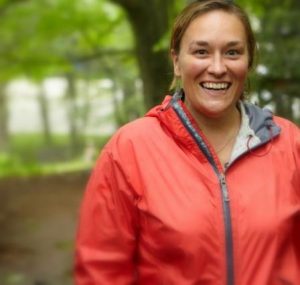This is the first of a monthly series in which the Attorney General will feature a Vermonter doing exemplary work in their community. Have someone you think should be featured? Email AGO.CAP@vermont.gov.

Sarah Waring serves as the Executive Director of the Center for an Agricultural Economy (CAE) building a regenerative, locally based, healthy food system in the NEK and beyond.
Sarah was born and raised in Glover, VT, but spent a decade outside of the state, working in the Rocky Mountains and in Washington DC. Her background includes community development, federal land use planning and management, conservation, outdoor education and non-profit work.
Since coming to the Center for an Agricultural Economy in 2013, she has worked with the Board and staff there to increase the viability of the VT Food Venture Center (VFVC), a shared-use food business incubator and food hub, designed to support entrepreneurs and farmers with industrial kitchens, storage, and technical assistance. She graciously took the time from her busy schedule to answer a few of our questions:
What inspires your work with CAE and VFVC?
First and foremost, I get to work with visionary people, who are also grounded, intelligent and hardworking. That’s motivation to do my own best work. Whether its our staff and volunteers, the farmers who are stewarding the land, or the entrepreneurs who are growing their businesses, we have wonderful people around us. But then secondly, our mission is critical to our region – because we need to build a place-based economy, with local ownership. Its also critical to the globe – because our food system is broken. We can make changes to global trends, like hunger, global warming and more, by starting locally to fix our food system. So that’s the urgency behind the work we do!
